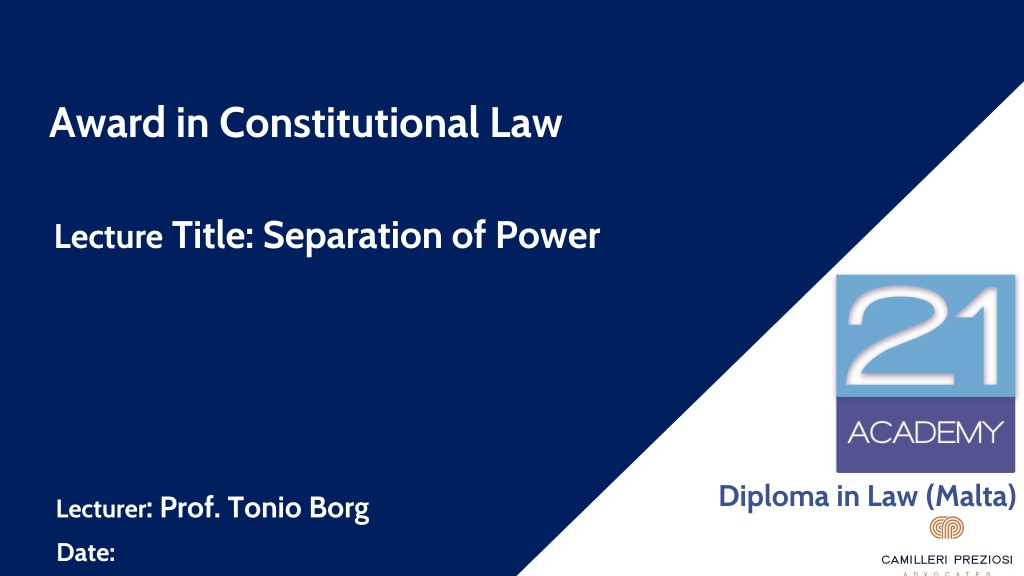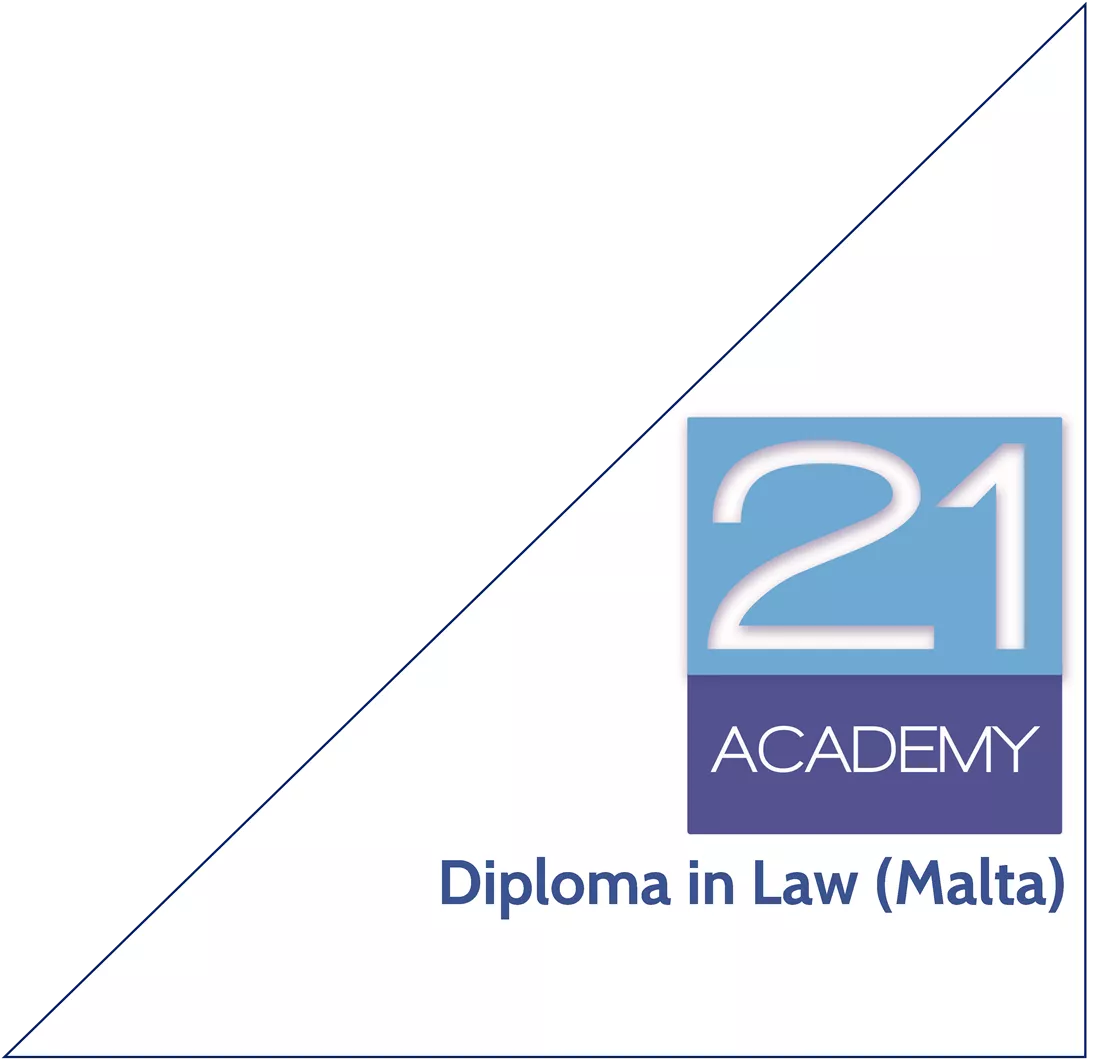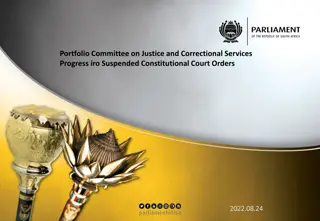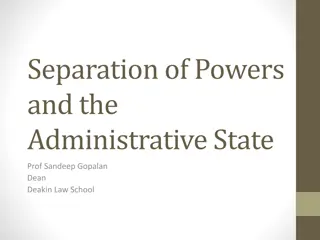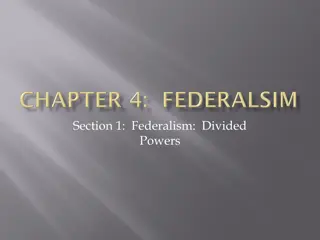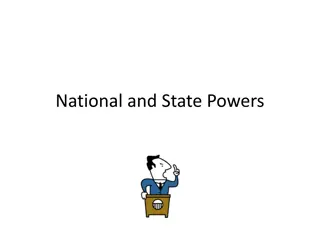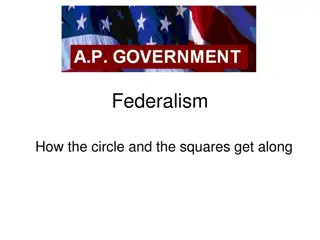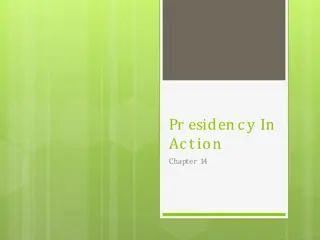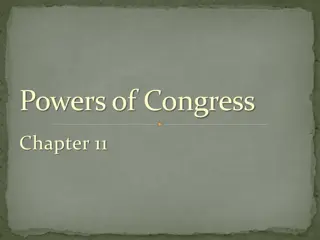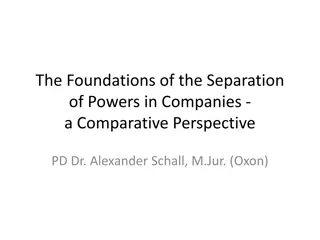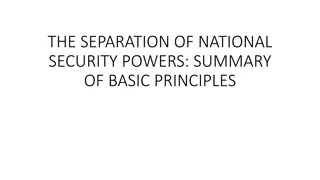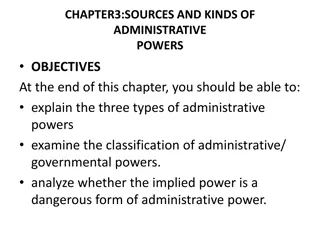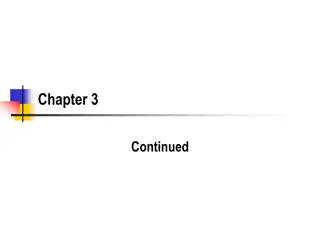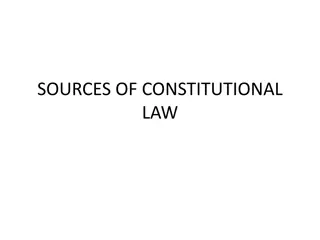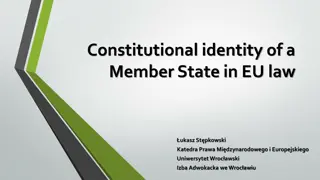Understanding Separation of Powers in Constitutional Law
Explore the concept of separation of powers in constitutional law, as depicted through the lens of the Diploma in Law program from Malta. Learn about the principles of checks and balances, the relationship between the Executive and the Legislature, and the significance of the rule of law in a democratic society.
Download Presentation

Please find below an Image/Link to download the presentation.
The content on the website is provided AS IS for your information and personal use only. It may not be sold, licensed, or shared on other websites without obtaining consent from the author. Download presentation by click this link. If you encounter any issues during the download, it is possible that the publisher has removed the file from their server.
E N D
Presentation Transcript
Diploma in Law (Malta) Click to edit Master title style Award in Constitutional Law Click to edit Master text styles Second level Third level Fourth level Fifth level Lecture Title: Separation of Power Diploma in Law (Malta) Lecturer: Prof. Tonio Borg Date:
Diploma in Law (Malta) Click to edit Master title style Click to edit Master text styles Second level Third level Fourth level Fifth level Montseqieu: L Esprit des Lois The Spirit of the Laws (1748) Power must be checked by power . A system of checks and balances rather than water tight compartments One of the pillars of a constitutional democracy . Government powers should be divided so that no single person or body can exercise unlimited power .
Diploma in Law (Malta) Click to edit Master title style Click to edit Master text styles Second level Third level Fourth level Fifth level one of three candidates submitted to him by a Judicial Appointments Committee set up in 2020 where judiciary has a majority. They are removed by the Commission for the Administration of Justice in which the judiciary also has a majority. The Chief Justice however is appointed by two thirds majority of all Mps. There is agreement that in a democratic state the judiciary should be kept separate from the other two organs. Members of the judiciary are appointed by the President who chooses The Constitutional Court may annul a law passed by the Legislature (Marbury v Madison `1803 )
Diploma in Law (Malta) Click to edit Master title style Executive and Legislature Click to edit Master text styles Second level Third level Fourth level Fifth level the Ministers have to be members of the legislature . Besides the President appoints as Prime Minister the member of Parliament who in his opinion is best able to command the support of a a majority of MPS. When it comes to this relationship constitutional systems differ. In the Parliamentary democracy , the Executive and the Legislature are close. In the UK system which we have adopted the Prime Minister and The Ministers are then ap[pointed by the President on the binding advice of the Prime Minister from amongst members of parliament.
Diploma in Law (Malta) Click to edit Master title style Executive and Legislature Click to edit Master text styles Second level Third level Fourth level Fifth level collectively responsible to the legislature. The Executive must enjoy the confidence of the legislature and if it loses that confidence then the Prime Minister must resign or hold fresh general elections . Therefore it is said the the Government is The Prime Minister also has the power to advice the President to dissolve the legislature at any moment in time.
Diploma in Law (Malta) Click to edit Master title style Rule of Law Click to edit Master text styles Second level Third level Fourth level Fifth level Not Rule BY Law but Of law. It is desirable to be governed by rules rather than by the discretion of rulers Aristotle :a government of laws not men A politico-legal concept. Servi Legum sumus ut libere esse possimus *(Cicero) Made popular by A.V. Dicey: a) Government by law. Everything has to have a source in law. Supremacy of law b) No one is above the law/equality before the law c) The Constitution is the result of the ordinary law
Diploma in Law (Malta) Click to edit Master title style Rule of Law Click to edit Master text styles Second level Third level Fourth level Fifth level Tom Bingham The Rule of Law 1959 New Delhi Declaration by the International Commission of Jurists emphasized two further elements (a) regular elections electing a representative government and (b) the independence and impartiality of the judiciary. Laws should be intelligible and precise enough to guide conduct Minimum discretion though discretion cannot be removed completely Apply equally to all unless differences are clearly justified
Diploma in Law (Malta) Click to edit Master title style Rule of Law Click to edit Master text styles Second level Third level Fourth level Fifth level Judicial review to ensure that decision makers act reasonably Give adequate protection to fundamental human rights Machinery to solve disputes at no excessive cost Fair adjudicative procedures State complies with International Law
Diploma in Law (Malta) Click to edit Master title style Rule of Law and Maltese Constiution Click to edit Master text styles Second level Third level Fourth level Fifth level A Chapter on fundamental Human Rights (FHR) An appeal to the European Court of Human Rights A Supreme Constitution. A Constitutional Court which can annul anything unconstitutional
Diploma in Law (Malta) Click to edit Master title style Rule of Law and Maltese Constiution Click to edit Master text styles Second level Third level Fourth level Fifth level An independent and impartial judiciary (a) security of tenure quamdiu se bene gesserint (b) salaries cannot be reduced (c) their salaries are a direct charge on the Consolidated Fund Free and Fair elections - Electoral Commission, all political parties have access, secret ballot, corrective mechanisms, elections may be annulled for widespread abuses
